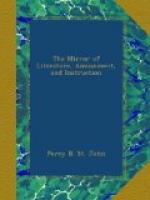We have fewer enemies than we imagine: many are too indolent to care at all about us, and if the stream of censure is running against us, the world is too careless to oppose it. If we could hear what is said of us in our absence we should torment ourselves without real cause, for we should seldom hear the real sentiments of the speaker; many things are said in mere wantonness, and many more from the desire of being brilliant.
The man who feels he is in the right is seldom dogmatical, for truth is always calm and requires not violence to enforce her arguments: we should desist from the contest the moment we feel anxious about victory, because that anxiety must make us less particular about the truth.
Quickness of intellect is no proof of solidity: the deepest rivers flow on the smoothest.
The reason why there are so few instances of heroism in modern times is the total decay of political virtue: we are broken up into small parties and associate only with our families, thus forgetting the public, in our regard for private interest: the ancients were taught rather to live for the benefit of the whole community.
An over-refined philosophy begets sensitiveness, and is as little to be coveted as a moderate share of it is beneficial.
It seems to be the business of life to lay by fresh cause for anxiety and discontent by increasing our estate; whereas we should rather know how to lose it all, and yet be contented.
There are some people, who though very amiable in the main, and obliging in their offices to others, have yet that most unhappy propensity of being gloomy over every thing.
It is one of the wisest provisions of Fortune that the same vices which ruin our estates, take away also the means of enjoying them by depriving us of health.
There is more virtue in obscurity than is commonly supposed; and perhaps there have been nobler specimens of magnanimity in low life, than even the page of history can boast.
Knowledge of the world must be combined with study, for this, as well as better reasons: the possession of learning is always invidious, and it requires considerable tact to inform without a display of superiority, and to ensure esteem, as well as call forth admiration.
Deceit has the effect of impoverishing, as well as enriching, men: the prodigal becomes poor by pretending to be richer than he really is, while seeming poverty is the very making of a miser.
F.
* * * * *
STANZAS TO THE SPIRIT OF MORNING.
(For the Mirror.)
Angel of morn! whose beauteous home
In light’s unfading
fountain lies;
Whose smiles dispel night’s sable
gloom,
And fill with splendour earth
and skies,
While o’er the horizon pure and
pale,
Thy beams are dawning, thee
I hail.




